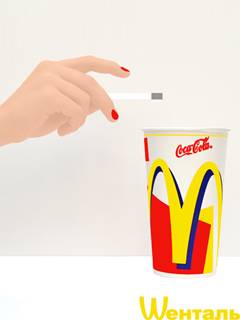

| Home | Our Leadership | Our Economies | Our Wars | Our Perspectives | Our Culture | Links | About |
Article by Masha Danova
Art by Andrey Shental
A busy hour in the center of Moscow - crowds of office-workers rushing back and forth in the street, eager to grab a fast lunch. The easiest choice is of course McDonalds, though maybe not the quickest, considering the lines. The lack of space inside the restaurant is no hindrance for the couple that came here to celebrate their wedding. A girl in a white bride's dress eating hamburgers and looking immensely happy must be a vision. But alas! - No, this is Russian reality. This is how much we love Ronald.
The USSR was probably one of the slowest countries in the world in terms of food. Of course, we had our pies and other perfectly Russian 'fast' products, but in all those 70 years we never even came close to the American pattern of fast food. Everything capitalist was banned, and Russian stomachs were securely protected from western French-fries and hambugers by the heavy Iron Curtain. But then, logically enough, the soviet system collapsed - and the gates for the previously 'illegal' western culture started opening.
Pizza Hut was the first fast-food company to come to the Russian market. In 1988, the first restaurant was opened - and several years later our famous (infamous for some) perestroika-guy appeared in a Pizza Hut commercial. But the Russian audience at which it was supposed to be aimed never saw it. It was much more a funny attraction for American viewers - 'Look, Gorbachyov eating pizza! Wow!' - than an actual advertisement.
There were a lot of such attractions at that time, all clearly proving the victory of capitalism over the far too old communist theory. The most obvious example is the grand opening of the first Russian McDonalds almost in the very heart of Moscow - on Pushkinskaya square.
It's hard to believe that, but records and photos don't lie: on the gloomy dawn of the 31st of January 1990, approximately 5,000 people, unspoiled by the fast fat and eager to get the first grab of hamburgers appeared at the gates of Mc-Paradise. The amount of Mac-eaters reached the fatal point of 30,000 later that day. And yes, the number of applicants for the job in the first Mc'D in Moscow was very close - 27,000. But only 605 were eventually chosen to be the priests of the new fast-food cult.
During the '90s, McDonald's was a sort of fetish for us Russians. We simply couldn't get enough of those golden French-fries, and the Big Mak was an absolute favorite, praised and adored. But oddly, many of us preferred to eat it layer by layer. I clearly remember how sure I was that this was the only way to consume it - first bread, then meat, then cucumbers and so on. Even the sauce was a thing in itself.
A 'good Russian tradition' for kids in '90s was to celebrate birthday at the local 'McDak' or any other fast food restaurant. Two of three Russians aged 19-20 can tell you his own Ronald-story, although maybe a bit unwillingly. I, personally, celebrated one of my birthdays at Baskin Robbins, a 'so 1992' children's ice-cream dream which moved out of Russia in 1998 during the financial crisis that made Pizza Hut and some other chains also leave the market. Pizza Hut returned, but in a 'slower' variation.

But McDonald's stayed - and honestly, I don't see any reason it shouldn't have. Russia was, and still is, the most precious market for the fast-food giant. There are now 199 restaurants all over Russia that are visited by some 600,000 people every day. Products for the Russian restaurants are produced by a huge plant called McComplex, located nearby Moscow.
Most of the Mc's in European cities - and even in American ones - are now gradually turning into empty and dangerous places, with bums and other marginal social elements. Vegetarianism and veganism are much more popular now in the Western world than Big Maks and french fries.
A foreigner in Moscow is usually shocked by the length of lines in Mc's. Here's a reasonable comment from an American tourist's blog: “American chains are very popular here. Every McDonalds I saw was packed. The branch on Pushkinskaya Ploshad is the busiest McDonalds in the world. The trick is: it is packed because it is relatively cheap”.
Cheapness is the key to the Russian heart, however pathetic it may sound. But, if you forget about all those oligarchs, who now represent Russia on a world-scale, you'll see a different situation. According to recent market research, 54% of Russian fast-food eaters consider cost, while only 25% regard cleaniness.
There's a well-known concept, shared by a lot of artists and philosophers, that the U.S. represent masculinity, while Russia's soul is utterly feminine. Such is the case with fast food. In 1990, communism finally succumbed to the excessive charm of capitalism. Russia married Ronald McDonald. And they lived happily ever after.